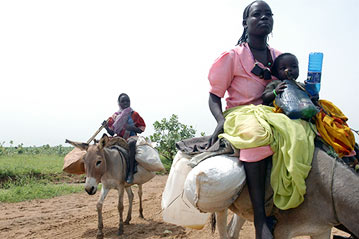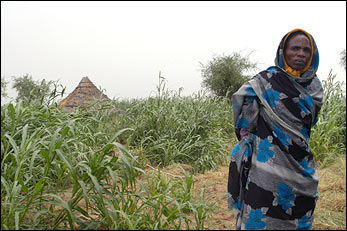UNHCR : Rains bring Darfur’s displaced villagers home to farm

Aug 31, 2005 (Borta, West Darfur) — Despite the volatile security situation in Sudan’s Darfur region, hundreds of villagers uprooted by the conflict are making short trips home to cultivate their land during the rainy season while smaller numbers have returned for good.
According to UNHCR teams in West Darfur province, some 400 internally displaced people have temporarily come back to their village of Borta about 15 km north of the provincial capital, El Geneina. Making up 64 out of the 68 families in the village, they have returned to cultivate their crops at the peak of the rainy season.
Among them is Hawa, a 25-year-old mother of four who has been living in Dorti camp on the outskirts of El Geneina for the last two years. Her husband remained in the camp as “it is too dangerous for men to come back, they would more than likely be killed by groups of armed men than us women,” she explains.

Most villagers stay three days in Borta and go back to the camp where they feel safer, then come back again some days later. Only the elderly women, who are less fearful of potential attacks, will remain in the village after the rainy season.
The first thing Hawa did when she arrived back in Borta in June was to reconstruct her hut, which had been destroyed by armed men last year. She then planted okra in her fields, and sorghum and tomatoes in her garden. Within weeks, she will load her precious harvest on her donkey’s back and will ride back to Dorti. She hopes to be able to do two trips a day between her village and the camp: “We cannot leave any food stock behind us, it will be stolen.”
Hawa is luckier this year. In 2004, she made the same journey and also planted okra, but her crops were completely destroyed twice and there was hardly anything left to bring back to her family in the camp.
“Two men arrived in my fields and let their animals eat my crops,” she recalls of last year’s incidents. She qualifies them as Janjaweed, the Arab militia that has been raiding Darfur for the past two years. “One of them had a gun. I asked them why they let their cows graze on my field and they replied that this is their land.”
She says they asked her for food and threatened to beat and kill her if she did anything to prevent the animals from eating the okra. She adds that this year, she feels a little safer going back to her village as the security situation seems to have improved slightly.
“These movements, although very tentative, show a significant improvement compared to last year when we seldom saw anyone venturing outside the camps to cultivate during the rainy season,” says UNHCR in Darfur. “This shows that people are making attempts to go back to their lands, even though they still have strong concerns about the general security environment.”
On the way to Krenick town recently, UNHCR teams passed women who were planting sorghum in their villages. Their homes were completely burned down and flattened two years ago and they found refuge in Krenick camp. Every day in June, they walked three hours from the camp to their fields in order to cultivate. Within hundreds of metres, groups of nomads had brought their camel herds to drink at the water point.
“We don’t necessarily feel safe planting during the day,” said Hadja, one of the displaced women. “But we need to harvest to have food for our family and we also want to ultimately go back to our land.”
The conflict in Darfur has completely changed the dynamics between African tribes and Arab nomadic tribes. Nomads used to respect traditional agreements about the time of the year their herds are allowed to use the cultivated land for grazing. This agreement does not seem to exist anymore.
Before the conflict, the sheiks (local leaders) in Borta and in many villages of West Darfur would receive a letter from the government instructing the nomads to graze their herds only within specified time periods and areas. This year, the sheiks have not received such a letter and are fearful of confronting the nomads whose animals sometimes destroy the planted fields.
Despite these tensions, small numbers of displaced people have come back for good to their villages in West Darfur. Out of 600,000 displaced villagers in this area, UNHCR estimates that 20,000 have permanently returned to their homes in the past 15 months.
“These are mainly people who did not want to go to camps in Chad or in Darfur and were remaining at the Chad-Sudan border without any assistance,” explains UNHCR. “These are the ones who were more eager to go back and plant.”
At this point, the UN refugee agency still considers that the security situation in Darfur is not conducive to facilitate or promote the large-scale return of the 2 million displaced people – a principle UNHCR High Commissioner António Guterres stressed strongly last week during his visit to Darfur.
However, the refugee agency – whose role includes ensuring that there are no forced returns – has been assisting the families who made the voluntary and personal decision to come back to their villages of origin, so that they do not move again in search of basic facilities. UNHCR, together with its non-governmental partners, have started to implement community-based reintegration projects to assist these returning communities. The projects, which emanate directly from these communities, include the rehabilitation of schools and health structures in villages of return. Seeds and tools have also been distributed to returning families to assist them in their efforts to regain their livelihood.
By Helene Caux
In Borta, West Darfur, Sudan
